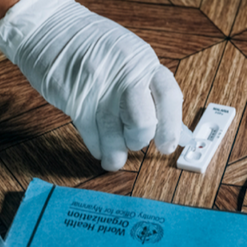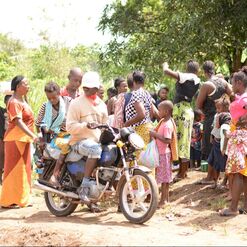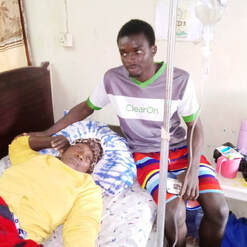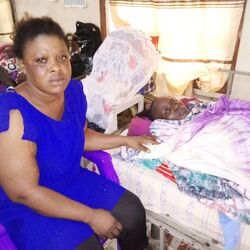 Catherine, aged 50, came to the hospital with classic malaria symptoms of malaise, anorexia, headache, body pain, and vomiting. She was treated with intravenous drugs and rehydration, and discharged in satisfactory condition within a few days. Sierra Leone has one of the highest burdens of malaria in the world, according to UNICEF. The country's entire population is at risk of the disease and it is one of Sierra Leone’s leading causes of death and illness. Malaria is the reason behind nearly four in ten hospital consultations countrywide. Through in-hospital treatment and village outreach, Mercy Hospital treats hundreds of children and adults for severe malaria infection every month.  "Okada" motorbikes are the primary mode of transportation in Sierra Leone. "Okada" motorbikes are the primary mode of transportation in Sierra Leone. Sierra Leone ranks 21st in the world for deaths due to road accidents, so it's not surprising that many Mercy Hospital patients are victims of traffic injuries. The main mode of transportation are the ubiquitous "okadas" or hired motorcycles, which are often involved in serious and sometimes fatal accidents. Lansana was brought to Mercy Hospital by his family after the okada he hired collided with another. The bike rode over his ankle and he was bleeding profusely when he arrived. The surgical team repaired the damaged tissues and mobilized his foot. He was released to his family in satisfactory condition. "Words cannot express my gratitude to the team for saving my foot," Lansana said. "To God be all praises and honor."  Dr. Aruna Stevens says that the most prevalent condition he sees at Mercy is metabolic disease, which he believes is caused by poor diet and lack of health information among a predominantly poor and illiterate population (read more in our Summer 2020 Magazine.) Agnes, aged 60, had already been diagnosed with hypertension, but came to the hospital because of sudden weight loss, frequent urination, and increased thirst, indicating diabetes. Mercy's health education department prescribed medication, diet and exercise, and she was discharged with normal glucose. "I have always counted on the hospital for their professionalism," Agnes said.  Hawa was suffering from severe abdominal pain and distention, as well as difficulty breathing. She was diagnosed with hepatomegaly, or enlarged liver. She received medication to reduce liver toxicity, as well as a blood transfusion. She was discharged with instructions on lifestyle change to improve her health. Hepatomegaly is another metabolic disease that is commonly seen at Mercy Hospital, typically caused by severe malaria, chronic hepatitis or alcohol abuse.
0 Comments
Your comment will be posted after it is approved.
Leave a Reply. |
Follow us on social media
Archive
July 2024
Click the button to read heartfelt tributes to a beloved Bishop, co- founder of our mission!
Post
|
Helping Children Worldwide is a 501 (c) 3 nonprofit organization | 703-793-9521 | [email protected]
©2017 - 2021 Helping Children Worldwide
All donations in the United States are tax-deductible in full or part. | Donor and Privacy Policy
©2017 - 2021 Helping Children Worldwide
All donations in the United States are tax-deductible in full or part. | Donor and Privacy Policy






